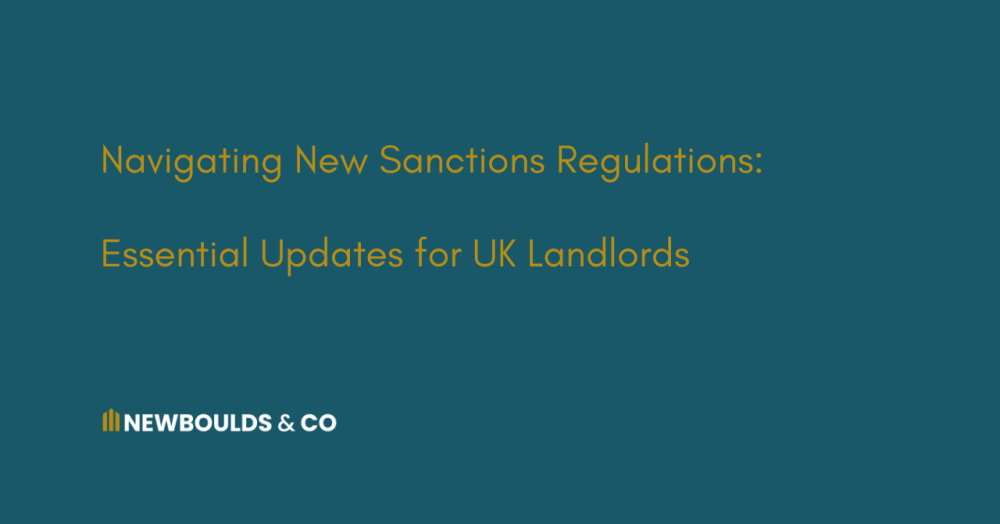Understanding the latest sanctions regulations is crucial for every landlord in the UK. These updates are designed to enhance financial security and compliance, and we're here to help you navigate them with ease and confidence.
The landscape of property management in the UK is constantly evolving, and staying informed about new regulations is paramount for landlords. Recently, there have been significant updates to sanctions regulations that directly impact how you manage your properties and vet your tenants. While these changes might seem daunting at first glance, they are ultimately about strengthening the integrity of the UK's financial system and ensuring a safer environment for everyone.
What Are the New Sanctions Regulations?
In essence, these new regulations broaden the scope of individuals and entities subject to financial sanctions. For landlords, this primarily means an increased responsibility to conduct thorough due diligence on prospective and existing tenants. The aim is to prevent individuals or organisations under sanctions from using property as a means to circumvent financial restrictions.
Previously, the focus might have been more on anti-money laundering (AML) checks for larger transactions. Now, the net is wider, requiring landlords and their agents to be more vigilant about who they are renting to. This isn't about making your life harder; it's about protecting you from inadvertently facilitating illicit activities and ensuring you remain compliant with national and international laws.
Why Are These Changes Happening Now?
The UK, like many nations, is continually refining its approach to combating financial crime and supporting global security efforts. Recent geopolitical events have accelerated the need for more robust sanctions regimes. Property, being a significant asset, can sometimes be exploited. These regulations are a proactive step to close potential loopholes and ensure that the UK property market remains transparent and secure.
For landlords in our local area, this means adapting your tenant onboarding processes. It’s about understanding that while our community thrives on trust and good relationships, a structured approach to compliance is now more important than ever.
Practical Steps for Landlords
So, what does this mean for you, practically? Here are some tips to help you comply:
1. Enhanced Tenant Vetting
Beyond standard referencing, you should now consider incorporating checks against official sanctions lists. While you might not have direct access to all government databases, working with a reputable estate agent who is well-versed in these regulations can be invaluable. We are director-led and stay abreast of all legislative changes to ensure our landlords are fully compliant.
2. Regular Reviews
Sanctions lists are dynamic and can change. It’s not just about checking at the start of a tenancy. For longer-term tenancies, periodic reviews might be advisable, especially if there are any changes in circumstances or new information comes to light.
3. Document Everything
Maintain meticulous records of all your due diligence checks. Should there ever be an inquiry, having clear, documented evidence of your compliance efforts will be crucial. This includes records of identity verification, right-to-rent checks, and any sanctions screening performed.
4. Seek Professional Advice
Navigating complex regulations can be challenging. Don't hesitate to seek advice from legal professionals or experienced estate agents. We can provide guidance tailored to your specific situation and help you implement robust processes that protect your investment.
5. Understand the Penalties
It’s important to be aware that non-compliance with sanctions regulations can lead to severe penalties, including significant fines and, in some cases, criminal prosecution. This underscores the importance of taking these updates seriously and integrating them into your property management strategy.
A Landlord’s Responsibility
Letting agents are now considered "relevant firms" under financial sanctions laws and are subject to the same reporting obligations as other sectors. Sanctions checks are designed to identify individuals or organizations on government sanctions lists related to money laundering, terrorist financing, and other serious crimes
Landlords must be screened at the point of formal instruction, with their identity verified against the UK sanctions list before any marketing or agreements. Tenants must be screened after the landlord accepts their offer but before the tenancy agreement is signed.
How We Can Help
At Newboulds & Co we understand the pressures landlords face. Our team is dedicated to providing you with the most up-to-date information and practical support to ensure your properties are managed compliantly and efficiently. We believe in being transparent and advising in your best interest, ensuring you're never caught off guard by new legislation.
These new regulations are a vital part of maintaining the integrity of the UK property market. By embracing them, you not only protect yourself but also contribute to a safer, more secure environment for everyone in our community. If you have any questions or need assistance in reviewing your current processes, please do not hesitate to get in touch. We’re here to help you every step of the way.

